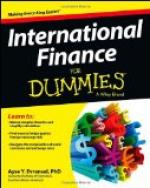FOOTNOTES:
[Footnote 3: “United Netherlands,” chap. xxxii.]
CHAPTER V
THE BENEFITS OF INTERNATIONAL FINANCE
When once we have recognized how close is the connection between finance and trade, we have gone a long way towards seeing the greatness of the service that finance renders to mankind, whether it works at home or abroad. At home we owe our factories and our railways and all the marvellous equipment of our power to make things that are wanted, to the quiet, prosaic, and often rather mean and timorous people who have saved money for a rainy day, and put it into industry instead of into satisfying their immediate wants and cravings for comfort and enjoyment It is equally, perhaps still more, true, that we owe them to the brains and energy of those who have planned and organized the equipment of industry, and the thews and sinews of those who have done the heavy work. But brain and muscle would have been alike powerless if there had not been saving folk who lent them raw material, and provided them with the means of livelihood in the interval between the beginning of an industry and the day when its product is sold and paid for.
Abroad, the work of finance has been even more advantageous to mankind, for since it has been shown that international finance is a necessary part of the machinery of international trade, it follows that all the benefits, economic and other, which international trade has wrought for us, are inseparably and inevitably bound up with the progress of international finance. If we had never fertilized the uttermost parts of the earth by lending them money and sending them goods in payment of the sums lent, we never could have enjoyed the stream that pours in from them of raw material and cheap food which has sustained our industry, fed our population, and given us a standard of general comfort such as our forefathers could never have imagined. It is true that at the same time we have benefited others, besides our own customers and debtors. We have opened up the world to trade and other countries




